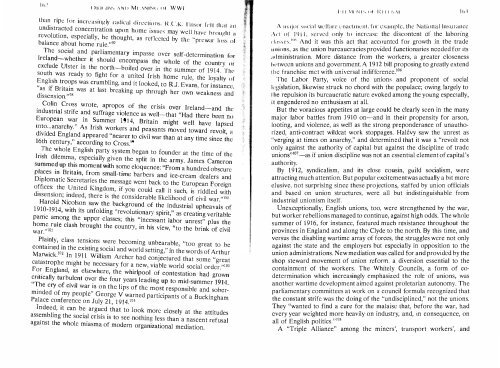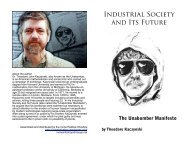CONTENTS - ouroboros ponderosa
CONTENTS - ouroboros ponderosa
CONTENTS - ouroboros ponderosa
You also want an ePaper? Increase the reach of your titles
YUMPU automatically turns print PDFs into web optimized ePapers that Google loves.
()JW ,JN, :\ NJ) iv1J',\NJN( ; (I] W\VI<br />
than ripe fur increasingly radical directiol1s. I{ ,C.l\... 1':lls0J kit lhal ;111<br />
undistracted concentration upon home isslies may well have hrought iI<br />
revolution, especially, he thought, as refleeled by Ihe "prewar loss 01<br />
balance about home rule.""<br />
The social and parliamentary impasse over self-determination r ....<br />
Ireland-whether it should encompass the whole of the country or<br />
exclude Ulster in the north-boiled over in thc Summcr of 1914. Th,'<br />
south was ready to fight for a united Irish homc rule, thc loyalty of<br />
EnglIsh troops was crumbling, and it looked, to RJ. Evans, for instance,<br />
"as if Britain was at last breaking up through her own weakness and<br />
disscnsion.n98<br />
Colin Cross wrote, apropos of the crisis over Ireland-and the<br />
industrial strife and sum'age violence as well-that "Had there been no<br />
Europcan wa , in Summer 19] 4, Britain might wcll have lapsed<br />
II1to ... anarchy. As Insh workers and peasants moved toward revolt a<br />
divided England appeared "nearer to civil war than at any time since ;he<br />
16th century," according to Cross."<br />
Thc whole English party system began to founder at the time of the<br />
Irish dilemma, especially given the split in the army. James Cameron<br />
summed up this moment with some eloquence: "From a hundred obscure<br />
places in Britain, from small-time barbers and icc-cream dealers and<br />
Di r .lomatie Secretaries the message went back to the European Foreign<br />
offIces: the Umted Kingdom, if you could call it such, is riddled with<br />
dissension; indeed, there is the considerable likelihood of civil war."l00<br />
Harold Nicolson saw the background of the industrial upheavals of<br />
1910-1914, with its unfolding "revolutionary spirit," as creating veritable<br />
pamc among the upper classes; this "incessant labor unrest" plus the<br />
home rule clash brought the country, in his view, "to the brink of civil<br />
war., , 101<br />
Plai . nly, class tensions were becoming unbearable, "too great to be<br />
contall1ed in the existing social and world setting," in the words of Arthur<br />
Marwick.'02 In 1911 William Archer had conjectured that some "great<br />
catastrophe mIght be necessary for a new, viable world social order."103<br />
For England, as elsewhere, the whirlpool of contestation had grown<br />
entreally turbulent over the four years leading up to mid-summer 1914.<br />
"The cry of civil war is on the lips of the most responsible and sober<br />
mll1ded of my people" George V warned participants of a Buckingham<br />
Palace conference on July 21, 1914.'04<br />
Indeed, it can be argued that to look more closely at the attitudes<br />
assembling the social crisis is to see no thin" less than a nascent refusal<br />
. D<br />
agamst the whole miasma of modern organizational mediation.<br />
I ' I 1 r'>11 N 1 '., ( II, 1\. 1 1 I I',:\ I<br />
t\ JII;ljU1' stlcial wc.lfare. L'llactllllnl. for e.xample. the Nati( ! nal lnsur;lIcc<br />
;\ 1"1 oi" I 'J I I, sClveo only to increase the discontent at the labonng<br />
,·Iasses. "" And it was this acl that accounted for growth in tbe trade<br />
ullions, as the union bureaucracies provided functionaries needed for Its<br />
."Iminislration. More distance from the workers, a greater closeness<br />
I,..tween unions and government. A 1912 bill proposing to greatly extend<br />
lire franchise met with universal intlifference.'06<br />
. .<br />
The Labor Party, voice of the unions and proponent 01 SOCial<br />
it:gislation, likewise struck no chord with the populacc; oWll1g largely to<br />
I he repulsion its bureaucratic nature evoked among the young espeCially,<br />
it engendered no enthusiasm at all.<br />
.<br />
But the voracious appetites at large could be clearly seen In the many<br />
major labor battles from 1910 on-and in their propensity for arson,<br />
looting, and violence, as well as the strong preponderance of unautho<br />
rized anti-contract wildcat work stoppages. Halcvy saw the unrest as<br />
"vering at times on anarchy," and dctermin d that it :, a "revolt not<br />
only against the authority of capital but agams! the dlscIphne of t : d,<br />
unions ,, '07-as if union discipline was not an essential clement of capltal s<br />
authority.<br />
. . .<br />
By 1912, syndicalism, and its close cousin, gUIld SOCialIsm, werc<br />
attracting much attention. But popular exertementwas actually a brt more<br />
elusive not surprising sincc these projections, staffed by unron offiCIals<br />
and bsed on union structures, were all but indistinguishable from<br />
industrial unionism itself.<br />
Unexeeptionally, English unions, too, were strengthened hy the war,<br />
but worker rebellions managed to continuc, against high odds. The whole<br />
summer of 19]6, for instance, featured much resistance throughout the<br />
provinces in England and along the Clyde to the north. By th,s !lme, and<br />
versus the disabling wartime array of forces, the struggles were not only<br />
against the state and the employers but especially in opposition to the<br />
union administrations. New mediation was callcd for and provldcd by the<br />
shop steward movement of union rdor ?" a diversion essential to the<br />
containment of the workers. The WhItely Councils, a form of co<br />
determination which increasingly emphasized the role of unions, was<br />
another wartime dcvelopment aimed against proletarian autonomy. The<br />
parliamentary committees at work on a council formula recognized that<br />
the constant strire was the doing of the "undisciplined," not the unrons.<br />
They "wanted to find a cure for the malaise that, before the war, bad<br />
every year weighted more heavily on industry, and, In consequence, on<br />
all of English politics.,,!08<br />
A "Triple Alliance" among the miners', transport workers', and






